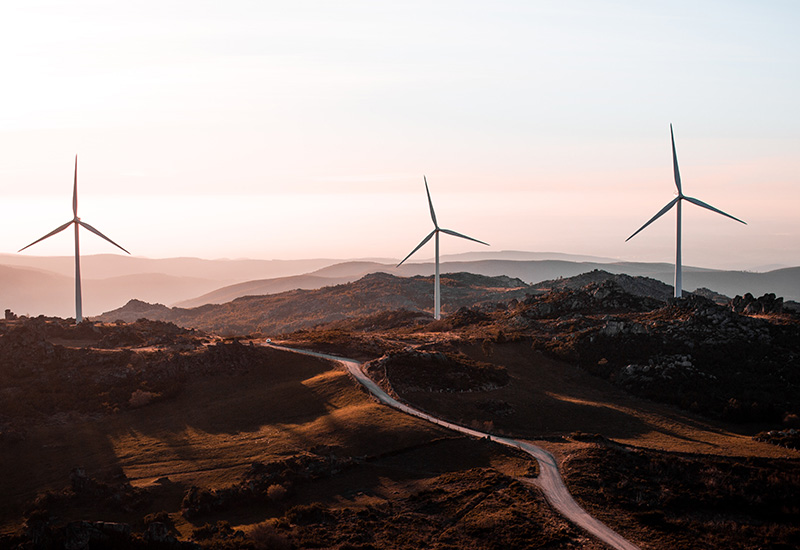WORDS James Plaskitt
Electricity bills are soaring. At first sight, Portugal, with its abundant supply of wind and sunshine, should be able to protect itself from the current global energy storms. So why is this ‘energy island’ still being buffeted?
Although Portugal often thinks of itself as an ‘energy island’, it is far from immune from the dramatic movements in global energy prices that have followed the end of the pandemic and the Russian incursion into Ukraine. Wholesale electricity in Portugal was trading at 35€ in 2020. But by March of this year, that price had soared to 280€. It has since settled back to around 160€ – still a huge hike in just two years.
Portugal ranks as the ninth most expensive EU country for retail electricity. But taking the cost of the energy alone, it ranks as one of the lowest – the reason for the relatively high final price is the level of taxes and tariffs added to the energy production cost; they alone account for 67% of the bill. The high charges are offset for households with low incomes. Around 14% of Portuguese households qualify for a ‘social tariff’ for their electricity. This provides a lower price, currently saving these households on average around 115€ on their bill. The cost is met by the energy companies.
Although Portugal is doing well in establishing renewable energy sources, the country is not yet self-sufficient and still needs to import energy to meet total demand. The main imported energy is natural gas, which is fed through the Maghreb-Europe Gas Pipeline, bringing gas in, via Spain, from Algeria. Portugal, therefore, has no reliance on Russian gas, unlike many of its EU partners.
Portugal’s energy success story is its development of renewable sources. At the moment, around 26% of electricity generation comes from wind power, with the majority of the farms being located on-land in the north of the country. Hydropower accounts for a further 23% of electricity generation, followed by biomass plants generating a further 7% and finally solar, accounting for around 4%. Portugal’s coal-fired stations have now closed and it has no nuclear stations. The balance of electricity supply depends on gas imports.
The government has set a target of achieving 80% of electricity supply from renewables by 2030. To get there, it is undertaking significant investment in further hydro-power projects, as well as the development of photovoltaic farms, most of which will appear in the south of the country where solar radiation is at its highest. The programme also includes improving energy efficiency, for example through enforcing better building standards. The Near Zero Energy Building law introduced in 2019 imposes exacting standards on all new buildings over 1000 sq meters.
The move away from fossil fuel dependency is also being promoted by a switch to electric cars. Currently, around 15% of new purchases are electric vehicles. The target, backed by an extensive programme of new charging points, is to reach 36% by 2030 and 100% by 2050. The government is also investing 10 billion€ in rail electrification, which will include the Algarve line.
The 80% renewable energy target looks achievable. Already, in some quarters, the figure has come close to that. But, securing that level with certainty will depend on the heavy investments being allocated in time and on avoiding droughts, which hamper the contribution from hydropower.
Faced with surging energy costs and with Putin’s threat to shut down the Russian gas supply to Europe, the EU has attempted to hold a united front. However, the agreement reached in July showed how hard this is, given the different energy supply patterns amongst the member states. With its heavy dependence on Russian gas, Germany sought to secure an agreement that all member states would cut gas consumption by 15%. But it proved impossible to hold that line, especially with countries that had an even heavier dependence on gas. Portugal argued strongly against the plan on the grounds that it has no dependence on Russian gas, thanks to the Maghreb line. In the end, Portugal came away with a voluntary commitment to attempt a 7% reduction in its gas usage. If it can quickly bring some of its additional renewable sources online, this reduction would probably occur anyway. If progress is slowed, especially by droughts choking off hydro supply, then there will be little chance of even this more modest gas consumption reduction being delivered.
When it comes to the politics and finances that surround energy, no modern country is an island.
James Plaskitt was a minister in Tony Blair’s government in the UK. He is now retired in the Algarve.
Main image Tondela, Portugal © Afonso Coutinho













